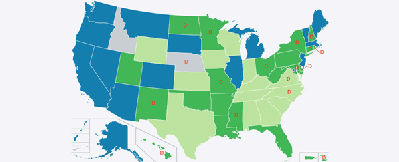Cannabis Possession and Medical Cannabis Laws by State – Part Two

To help cannabis growers, entrepreneurs and enthusiasts stay up-to-date; we created this two-part blog series briefly outlining cannabis possession laws by state. If you don’t find the state you’re looking for in the list below, please refer to our post: Marijuana Laws by State – Part One. If you’re planning to travel to other states, move, or even have a business idea, bookmark this page to always have it handy.
Cannabis Possession Laws by State: M-Z

Montana
The state of Montana changed its cannabis laws in the 2020 election. Medical marijuana was legal in Montana after a ballot in 2004. As of January 2021, recreational cannabis will also be allowed for adult use in the state. People over 21 years old can possess, carry, or grow up to one ounce (28 grams) of marijuana.
Nebraska
In Nebraska, although cannabis is decriminalized, it is still illegal for medical or recreational purposes. Anyone caught in possession can end up paying a fine of $300 and being enrolled in mandatory drug education sessions. Repetitive offenses can lead to increased penalties and prison time. Recent proposals for medical cannabis have failed.
Nevada
Nevada legalized recreational cannabis in 2017, and medical marijuana has been legal for licensed individuals since the year 2000. Adult citizens can carry up to 2.5 ounces or 70 grams of cannabis and grow up to 12 plants – unless there’s a licensed dispensary within 25 miles. This state allows distributors and licensed growers to cultivate the plant.
New Hampshire
The state of New Hampshire decriminalized cannabis possession in 2017, allowing adults to carry up to three-quarters of an ounce (21 grams). However, it is still illegal, and carrying cannabis can lead to a fine. Repeated offenses may result in a misdemeanor charge. Medicinal use has been legal since 2013.
New Jersey
In New Jersey, medical marijuana has been legal since 2010, and recreational cannabis will be permitted, taking effect in January 2021. New Jersey voters approved cannabis for recreational use in November 2020 in a referendum. Adults can possess up to one ounce or 28 grams of marijuana. However, the local legislation does not allow citizens to grow cannabis – you can only purchase from state-licensed dispensaries.
New Mexico
In the state of New Mexico, cultivation and transportation have only been legal for medical marijuana patients since 2007. New Mexico pioneered medical cannabis laws in the U.S., approving a research program back in 1978. Recreational cannabis has been decriminalized since 2019. The possession of up to 0.5 ounces or 14 grams is considered a petty misdemeanor offense, which leads to a $50 fine.
New York
In New York, recreational marijuana is illegal, but the state decriminalized cannabis in 2019 and made medical use legal in 2014. Adults carrying up to one ounce or 28 grams will pay a $50 fine, and if they have two ounces or 56 grams, the fine goes up to $100 for the violation. The state’s medical marijuana program only allows non-smoked use for certain circumstances.
North Carolina
Although North Carolina still considers growing and possessing marijuana illegal, even for medicinal purposes, the state decriminalized it in 1977. The only form of cannabis allowed for medical use is CBD oil, which was legalized in 2015. Any adult caught carrying up to 1.5 ounces, or 42 grams of marijuana can pay a fine of up to $1000, and it’s considered a misdemeanor.
North Dakota
North Dakota legalized medical cannabis in 2016, but recreational use, although decriminalized in 2019, is still considered illegal. Carrying up to 0.5 ounces or 14 grams is considered a criminal infraction and can lead to a fine of up to $1,000. Voters recently rejected attempts to make cannabis legal.
Ohio
Ohio legislation considers recreational marijuana illegal; however, it has been decriminalized since 1975. Carrying up to 3.5 ounces or 100 grams is a minor misdemeanor, and adults will be required to pay a small fine. Medical cannabis use was made legal in 2016, however only for a strict list of ailments, and smoking is prohibited by law.
Oklahoma
In Oklahoma, recreational cannabis is illegal. Medical marijuana was legalized in 2018, and adults with a State Medical Marijuana License are allowed to grow up to six mature plants and possess up to 3 ounces (85 grams) of cannabis. However, citizens don’t need a license to consume CBD oil extracted from industrial hemp.
Oregon
Oregon was the first state to decriminalize cannabis in the U.S. back in 1973. Since 2015, marijuana has been legal for both recreational and medicinal uses. Adults are allowed to possess up to one ounce or 28 grams. In a household with people over the age of 21, you can grow up to four plants for personal use. Medical marijuana cardholders, however, can designate a grower of their choice.
Pennsylvania
In Pennsylvania, recreational cannabis is illegal, and carrying up to one ounce (28 grams) can be punishable by 30 days in prison and a fine. Medical use, however, was legalized in 2016. Since 2014, some municipalities such as Philadelphia, Pittsburgh, Harrisburg, and others have decriminalized small amounts – up to 30 grams.
Rhode Island
In Rhode Island, although recreational cannabis is illegal, it was decriminalized in 2012. Medical marijuana use has been allowed since 2006 for a list of medical conditions. Medical cannabis patients can carry up to 2.5 ounces or 70 grams and grow up to 12 mature plants and 12 seedlings. To grow your medicinal cannabis in Rhode Island, you should register with authorities.
South Carolina
South Carolina considers all cannabis use illegal, both medicinal and recreational. Since 2014, CBD oil with less than 0.9% THC content is legal for specific medical conditions. Adults caught carrying up to one ounce or 28 grams of marijuana can be convicted with a misdemeanor, 30 days in prison, and the payment of fines. Repeated convictions can increase penalties.
South Dakota
Cannabis was considered illegal in South Dakota until recently. After the 2020 elections, both recreational and medicinal uses were deemed legal. The legislation will take effect in July 2021, including the cultivation for personal use and possession of up to 1 ounce or 28 grams. Until then, even testing positive for cannabis could be considered a misdemeanor offense in the state.
Tennessee
Marijuana is illegal in the state of Tennessee for recreational or medicinal purposes. The only form of possession allowed is CBD oil with a THC content of less than 0.9%. This is only to be used by people who suffer from epilepsy or seizures and have gained their doctor’s permission. Carrying even small amounts of cannabis can be punished as a criminal misdemeanor.
Texas
In Texas, recreational cannabis is illegal, and medicinal cannabis products only allow CBD oil with high CBD content and THC as low as 0.5%. Anyone caught carrying up to two ounces or 56 grams can be punished with up to 180 days in prison, suspension of their driver’s license, and fines that can reach $2.000. However, some municipalities adopted cite-and-release policies for small amounts.
Utah
The state of Utah considers recreational cannabis illegal. Medical use has been legal as of 2018 for a list of ailments. Growing, however, is prohibited. Any adult caught carrying small amounts of marijuana can be punished with a misdemeanor crime. Medical marijuana cardholders can carry up to 3.95 ounces or 112 grams.
Vermont
Vermont has allowed cannabis for medical use since 2004 and recreational use since 2018. Adults over the age of 21 can possess up to one ounce or 28 grams of marijuana and cultivate two mature plants per household.
Virginia
Although Virginia considers marijuana illegal for all purposes, the state decriminalized cannabis in 2020. People carrying up to one ounce or 28 grams can be punished with a misdemeanor and a small fine. Ever since 2015, the only form allowed is CBD oil with a THC content less than 5% for medicinal purposes. Cultivating cannabis in Virginia is illegal.
Washington
Since 2012, recreational cannabis has been legal in the state of Washington. Any adult over the age of 21 can carry up to one ounce or 28 grams, but personal cultivation is only permitted for medical patients. In the U.S., Washington was the first state to legalize recreational cannabis, and medical marijuana has been legal there since 1998. Growers are not allowed to sell cannabis to consumers, only retailers or processors.
West Virginia
West Virginia considers recreational cannabis illegal, and carrying any amount is regarded by law as a misdemeanor crime. Medical cannabis has been legal since 2017, but only for a small list of fifteen medical conditions. Any form of cannabis cultivation in households is illegal.
Wisconsin
The state of Wisconsin considers most forms of cannabis as illegal, except for industrial hemp and CBD oil with low THC content. Even CBD oil is only allowed for a small list of conditions. Carrying any amount is considered a misdemeanor, and repeated offenses can be punished as a felony. The state of Wisconsin, however, allows industrial hemp farming.
Wyoming
Wyoming is one of the states in the U.S. with some of the most restrictive laws regarding marijuana. Cannabis is not even permitted for medical purposes, only in the form of CBD oil with low THC. Possession of small amounts is considered a misdemeanor that can lead to up to a year in prison, plus fines of $1.000.
Have any questions about any of the information shared? Send us a message or chat with one of our Marijuana Specialists today!
Our Cannabis News articles are dedicated to discussing all things marijuana. This article is written and curated by Homegrown Nursery, a top-quality source of feminized cannabis clones in California.
